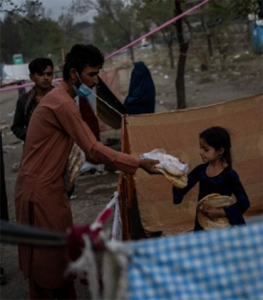Food crisis could create more Afghan refugees
Looming economic and food crises in Afghanistan could create fresh flows of refugees in the region, the UN High Commissioner for Refugees has warned.
UNHCR says the world should urgently provide promised aid to Afghanistan, citing a lack of resources that is hampering efforts to avert an economic crisis.
 “The humanitarian crisis in Afghanistan remains really dire,” a UNHCR spokesperson said.
“The humanitarian crisis in Afghanistan remains really dire,” a UNHCR spokesperson said.
“The focus has to be inside Afghanistan to avoid and avert another refugee crisis,” the spokesman said.
Since the Taliban took over Afghanistan on August 15, the country – already struggling with drought and severe poverty from decades of war – has seen its economy approach collapse.
Most of Afghanistan’s international assistance has been cut off, except for some humanitarian aid.
Billions of dollars in central bank assets held abroad have also been frozen, which has put pressure on the banking system.
“Our worry is Afghan suffering will increase, the impact will be inside… but also it could be beyond Afghanistan… in terms of displacement not only to countries like Pakistan and Iran that have been generous hosts of refugees for decades, but beyond,” the UNHCR spokesperson said.
The total needed for humanitarian operations in Afghanistan in the next few months is $US600 million.
UNHCR says that only 35 per cent of that figure had been provided by international donors, despite promises at a recent conference in Geneva where donors pledged more than $US1 billion in aid.
“Those pledges have to turn into reality, the cash has to be there for us to step in and support Afghans,” the spokesperson said.
UNHCR and aid agencies say there have been other challenges since the collapse of the government and the takeover of the country by the Taliban administration.
The lack of commercial flights has meant supplies have had to be taken in on special flights or by road.
A humanitarian hub had been set up in Uzbekistan to fly in supplies which were then driven across the border into northern Afghanistan.
UN agencies are engaging with members of the Taliban administration, the spokesperson said.
But a key issue was ensuring female local staff were able to get back to work in all parts of the country.
In Qatar, Taliban representatives have asked the US to lift a ban on Afghan central bank reserves at a meeting with US counterparts, Afghanistan’s acting foreign minister said in a recent interview.
The minister, Amir Khan Muttaqi, also said Washington would offer Afghans COVID-19 vaccines.
He said the Afghan delegation and US counterparts discussed “opening a new page” between the two countries, adversaries during the United States’ two-decade long occupation of Afghanistan.
Washington and other Western countries are grappling with difficult choices as a severe humanitarian crisis looms large over Afghanistan. They are trying to formulate how to engage with the Taliban without granting it the legitimacy it seeks while ensuring humanitarian aid flows into the country.
There was $US600 million worth donor promises during last month’s aid summit on Afghanistan, but humanitarian groups say they’re yet to see the cash.
Top of a list of humanitarian priorities is a food crisis. Food affordability has become an issue as incomes plummet and prices soar.
This has knock-on effects throughout the humanitarian sphere, from rising malnutrition to pressure on migration.
Aid groups are already reporting high rates of malnutrition as well as measles outbreaks and confirmed cases of cholera.
The UN says half the country’s children under five could face acute malnutrition by the end of the year.
Aid agencies and donors have plans to support Afghanistan’s ailing health sector for the next few months, but the system itself remains close to failure.
One early sign of the depth of the food crisis is that urban, middle-class families are now among the hungry, reports say.












